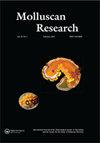Phylogeography of the intertidal marine bivalve Lasaea hinemoa (Mollusca: Bivalvia) in New Zealand
IF 0.6
4区 生物学
Q3 ZOOLOGY
引用次数: 0
Abstract
ABSTRACT Genetic investigations of members of the bivalve genus Lasaea have revealed unexpected diversity in the genus, as well as close affiliations between geographically distant populations. Here we investigate the phylogeography of the New Zealand species L. hinemoa using mitochondrial and nuclear gene sequences (cytochrome c oxidase subunit III and Internal Transcribed Spacer 2, respectively) from populations around the country. Additionally, we designed novel microsatellite markers, which enabled us to check the specific species status implied by the two single-gene markers. Lasaea hinemoa individuals fell into four clades. Clades I and III were numerically dominant, with a suggestion of some biogeographic structure around the coasts of mainland New Zealand, and we argue they represent separate cryptic species. Samples from the subantarctic Antipodes Island contained individuals from two clades (I and II). The latter clade is close to populations from the Kerguelen Islands, which suggests possible transoceanic dispersal via the Antarctic Circumpolar Current. Clade IV, represented by small numbers of individuals from Picton and Mahia, appears to be the result of transoceanic dispersal by yet another Lasaea species.新西兰潮间带海生双壳动物的系统地理学
对双壳属Lasaea成员的遗传调查揭示了该属意想不到的多样性,以及地理上遥远的种群之间的密切联系。本文利用线粒体和细胞核基因序列(分别为细胞色素c氧化酶亚基III和内部转录间隔器2)对新西兰L. hinemoa进行了系统地理学研究。此外,我们还设计了新的微卫星标记,使我们能够检查两个单基因标记所暗示的特定物种状态。犀草属个体可分为4个支系。进化支I和进化支III在数量上占主导地位,这表明在新西兰大陆海岸周围存在一些生物地理结构,我们认为它们代表了不同的隐种。亚南极对跖岛的样本包含两个分支(I和II)的个体。后一个分支接近Kerguelen群岛的种群,这表明可能通过南极环极流越洋扩散。以皮克顿和马希亚的少量个体为代表的进化枝IV,似乎是另一个Lasaea物种越洋扩散的结果。
本文章由计算机程序翻译,如有差异,请以英文原文为准。
求助全文
约1分钟内获得全文
求助全文
来源期刊

Molluscan Research
生物-动物学
CiteScore
1.80
自引率
10.00%
发文量
27
审稿时长
>12 weeks
期刊介绍:
Molluscan Research is an international journal for the publication of authoritative papers and review articles on all aspects of molluscan research, including biology, systematics, morphology, physiology, ecology, conservation, biogeography, genetics, molecular biology and palaeontology.
While the scope of the journal is worldwide, there is emphasis on studies relating to Australasia and the Indo-west Pacific, including East and South East Asia. The journal’s scope includes revisionary papers, monographs, reviews, theoretical papers and briefer communications. Monographic studies of up to 73 printed pages may also be considered.
The journal has been published since 1957 (as the Journal of the Malacological Society of Australia until 1993). It is free to members of the Malacological Society of Australasia and the Society for the Study of Molluscan Diversity.
 求助内容:
求助内容: 应助结果提醒方式:
应助结果提醒方式:


